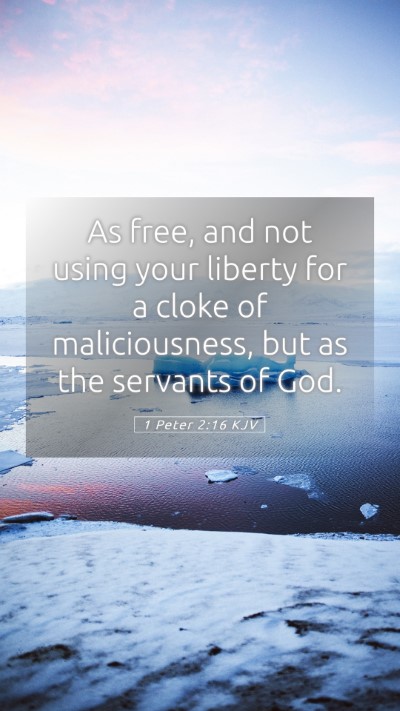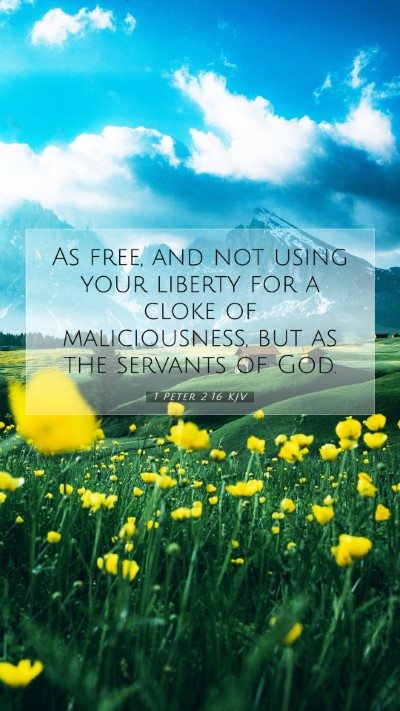1 Peter 2:16 (KJV): "As free, and not using your liberty for a cloke of maliciousness, but as the servants of God."
Summary of 1 Peter 2:16: This verse emphasizes the concept of Christian freedom and how it should be exercised responsibly. It instructs believers to utilize their liberty not as an excuse for wrongdoing but as a means to serve God faithfully. The broader context of the passage reflects on the balance between freedom in Christ and submission to authority.
Bible Verse Meanings and Interpretations
1 Peter 2:16 serves as a significant teaching for understanding Christian liberty and the nature of true service to God. Below, we explore insights from notable public domain commentaries.
Insights from Matthew Henry
Matthew Henry highlights that the Christian's freedom is not a license to sin but a divine empowerment to live righteously. He argues that while believers have been liberated from the bondage of sin, they must remain vigilant against using their freedom as a pretext for malice or other sinful behaviors. Henry emphasizes that true freedom in Christ leads to a life of service, reflecting God’s principles and character.
Insights from Albert Barnes
Albert Barnes expands on the theme of liberty by suggesting that genuine freedom involves serving God rather than oneself. He advocates for a clear distinction between liberty and licentiousness, noting that misuse of liberty undermines the witness of the believer. According to Barnes, the phrase “cloke of maliciousness” indicates the danger of concealing sinful behavior under the guise of freedom.
Insights from Adam Clarke
Adam Clarke provides a detailed examination of the verse, indicating that the apostle Peter calls believers to live honorably within society while simultaneously prioritizing their obligations to God. Clarke also discusses the metaphor of "as free" in the context of the believer’s new identity in Christ, encouraging a life characterized by godly conduct rather than self-serving behavior.
Understanding Scripture: A Deeper Dive
The Apostle Peter is writing to a group of believers who faced persecution and oppression. Within this context, 1 Peter 2:16 serves as both encouragement and instruction:
-
Principle of Christian Freedom: Believers are free through Christ, which liberates them from sin and the Law, yet places them under a higher ethical obligation.
-
Moral Responsibility: Freedom must be coupled with moral integrity; believers should avoid using their liberty as a cover for wrongdoing.
-
Service to God: The emphasis on being “servants of God” highlights that true freedom results in serving others and honoring God through righteous living.
Application and Practical Insights
Understanding 1 Peter 2:16 has practical implications for everyday life. Here, we outline ways to apply its teachings:
-
Living Out True Freedom: Reflect on how to express your freedom in Christ without compromising your testimony.
-
Engaging with Society: Be an example of integrity and kindness in your community, showing that Christian liberty leads to constructive behavior.
-
Regular Reflection: In Bible study groups, contemplate the ways you may unintentionally use your freedom as a cover for negative actions.
-
Encouraging One Another: Use this verse to encourage friends or family in their Christian walk, particularly when discussing the concepts of freedom and responsibility.
Cross References
To gain a fuller understanding of 1 Peter 2:16, consider these related passages:
- Galatians 5:13: “For, brethren, ye have been called unto liberty; only use not liberty for an occasion to the flesh, but by love serve one another.”
- Romans 6:18: “Being then made free from sin, ye became the servants of righteousness.”
- 2 Corinthians 5:17: “Therefore if any man be in Christ, he is a new creature: old things are passed away; behold, all things are become new.”
Conclusion
1 Peter 2:16 compels believers to reflect on the nature of their freedom in Christ and the responsibilities that accompany it. By engaging deeply with the verse through various commentaries and reflections, Christians can understand how to live authentically and serve God while navigating the complexities of life.
In conclusion, the insights gathered from public domain commentaries such as those by Matthew Henry, Albert Barnes, and Adam Clarke provide a rich tapestry of understanding around this verse. Whether you're involved in online Bible study or participating in a traditional group setting, these insights serve as valuable tools in Bible study lessons focused on living out Scriptural truths in daily life.


